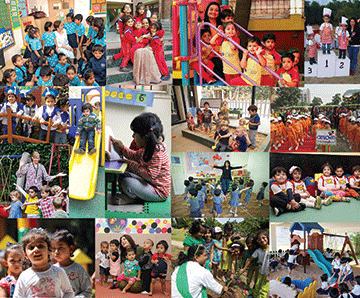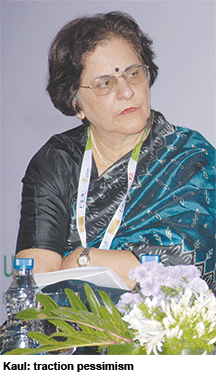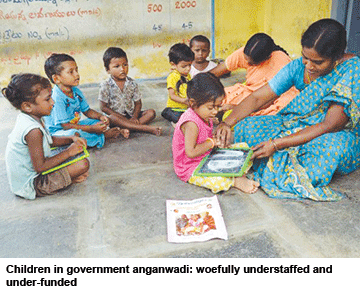For the sixth annual EducationWorld India Preschool Rankings 2015 survey, over 100 field researchers of the Delhi-based C fore interviewed 6,283 parents, principals and teachers in ten selected cities. Moreover in a departure from past practice, this year’s survey segregates preschools into three separate categories — owned/proprietary, franchised and pre-primaries of composite schools – Dilip Thakore & Summiya Yasmeen
 Persistent advocacy of universal early childhood care and education (ECCE) is a particularly noteworthy achievement of EducationWorld which completed 16 years of uninterrupted publication last month. After your editor was educated about the vital importance of ECCE for developing human capital and enabling socio-economic development by Los Angeles-based philanthropist-educationist Lowell Milken, co-promoter of Knowledge Universe (which owned over 2,500 Kindercare pre-primaries in the US) and the Milken Institute (one of America’s most respected think tanks), in 2005, this publication has conducted five annual surveys to identify and celebrate India’s best pre-primary schools as exemplars to educationists and edupreneurs interested in upgrading Indian education to global standards. It is a canon of faith in EducationWorld that without the strong foundation of professionally administered early childhood care and education and preparation for formal schooling, children will remain handicapped throughout the education continuum.
Persistent advocacy of universal early childhood care and education (ECCE) is a particularly noteworthy achievement of EducationWorld which completed 16 years of uninterrupted publication last month. After your editor was educated about the vital importance of ECCE for developing human capital and enabling socio-economic development by Los Angeles-based philanthropist-educationist Lowell Milken, co-promoter of Knowledge Universe (which owned over 2,500 Kindercare pre-primaries in the US) and the Milken Institute (one of America’s most respected think tanks), in 2005, this publication has conducted five annual surveys to identify and celebrate India’s best pre-primary schools as exemplars to educationists and edupreneurs interested in upgrading Indian education to global standards. It is a canon of faith in EducationWorld that without the strong foundation of professionally administered early childhood care and education and preparation for formal schooling, children will remain handicapped throughout the education continuum.
Also read: India’s unsung ECCE pioneers
Therefore to generate greater awareness about long neglected early-years provision, the management of this publication has also convened and staged five annual EducationWorld Early Childhood Education Global Conferences in which globally and nationally respected ECCE pundits have shared their knowledge and expertise of pre-primary education with principals and teachers from across India. The 6th EW Early Childhood Education Global Conference is scheduled to be held at Bangalore’s ITC Gardenia on January 23, 2016.
Nor has our effort to impact the critical importance of ECCE upon the public been restricted to private edupreneurs and educationists. Ab initio your editors have been stridently advocating transformation of the country’s 1.6 million anganwadis into fully-fledged pre-primary schools. Early childhood nutrition centres for newborns and lactating mothers, anganwadis were established in 1975 by the Central government under its Integrated Child Development Services (ICDS). Regrettably, the country’s million-plus anganwadis are woefully understaffed and under-funded (the Union Budget 2015-16 provided a mere Rs.8,355 crore or Rs.52,219 per centre per year).
Moreover, they grudgingly provide nutrition and very basic ECCE to only 75 million of the country’s 158 million children in the 0-5 age group. Allowing for an estimated 10 million middle and upper class children enrolled in the country’s 300,000 private pre-primaries, over 140 million children are currently deprived of any type of early childhood education — a colossal waste of human capital given that it’s now well-established that the brains of children are almost 90 percent developed by age eight.
The silver lining is that EducationWorld’s sustained banging of the drum for committing more time and resources towards early childhood care and education woke up — even if belatedly — the somnolent bureaucracy of the Union human resource development ministry in the Delhi imperium. In November 2013, at the fag end of its scandals-tainted 10-year tenure in office, the Union cabinet of the Congress-led UPA II government approved a draft National Early Childhood Care and Education (NECCE) policy to provide for professionally administered early care and education for the country’s neglected children in the 0-5 age group. However, in General Election 2014, the Congress party and its allies were roundly trounced and ousted from office at the Centre. Since then, little has been heard about the NECCE under the BJP-led NDA dispensation whose Union Budget 2015-16 for the first time in the history of post-independence India, made a lesser provision for education than in the previous year.
 “There’s a huge gap between aspirational demand for early childhood education and its provision. Unfortunately, social sector spending is not a priority of the new government which under its financial devolution programme, has passed on responsibility for implementing the NECCE to state governments. And although a few southern states and Maharashtra are drawing up their own ECCE policies, there’s greater emphasis on early childhood care and nutrition than on education. Therefore, I am not optimistic about NECCE gaining traction in the states. There’s too little awareness of the importance of ECCE in government and society, and children from low-income households are being prematurely pushed into formal schooling for which they are under-prepared, on a massive scale,” warns Dr. Venita Kaul, an alumna of Allahabad University and IIT-Delhi and currently director of the Centre for early childhood education and development at the Dr. B.R. Ambedkar University, Delhi.
“There’s a huge gap between aspirational demand for early childhood education and its provision. Unfortunately, social sector spending is not a priority of the new government which under its financial devolution programme, has passed on responsibility for implementing the NECCE to state governments. And although a few southern states and Maharashtra are drawing up their own ECCE policies, there’s greater emphasis on early childhood care and nutrition than on education. Therefore, I am not optimistic about NECCE gaining traction in the states. There’s too little awareness of the importance of ECCE in government and society, and children from low-income households are being prematurely pushed into formal schooling for which they are under-prepared, on a massive scale,” warns Dr. Venita Kaul, an alumna of Allahabad University and IIT-Delhi and currently director of the Centre for early childhood education and development at the Dr. B.R. Ambedkar University, Delhi.
Nevertheless, the commitment of your editors to ECCE for all infants is undiminished, and to continue to heighten awareness and celebrate excellence in this essential sector of Indian education, for the sixth successive year we present the painstakingly field researched and tabulated EducationWorld India Preschool Rankings 2015. For this year’s survey, a sample respondents’ database of 6,283 individuals comprising 5,593 SEC (socio-economic category) ‘A’ parents with at least one child in pre-primary education, and 690 principals and teachers with knowledge of ECCE were polled in 10 selected cities where there’s sufficient practice of ECCE.
Over 100 field researchers of the well-known Delhi-based market research and opinion polls company, Centre for Forecasting & Research Pvt. Ltd (C fore, estb. 2000) interviewed the respondents and persuaded them to rate preschools in their cities on 10 parameters of education excellence — competence of faculty, infrastructure, individual attention to students, leadership/management quality, innovative teaching, safety and hygiene, and provision for special needs children, among others. The rating awarded by each respondent was totalled to rank pre-primaries in each city. Schools assessed by less than 25 respondents are not ranked.
Moreover in a departure from past practice and in response to feedback received from pre-primary school managements and educators, many of whom complained about “unfair” and “irrational” comparisons, this year’s survey segregates preschools into three categories — owned/proprietary, franchised and pre-primaries of composite K-10/12 schools. “The logic of the segregation is that owned, franchised and preschools of larger composite primary-secondary schools are essentially of different character and their managements are confronted with differing operational challenges and constraints,” explains Premchand Palety, an engineering alum of Panjab University and Delhi’s Fore School of Management, and promoter-CEO of C fore.
In the pages following, we present revised and unprecedented league tables rating and ranking the country’s most reputed pre-primaries divided into three categories in 10 major cities, to enable young parents to choose the most appropriate preschools for their children.
To read the EW India Preschool Rankings 2015 please visit:























